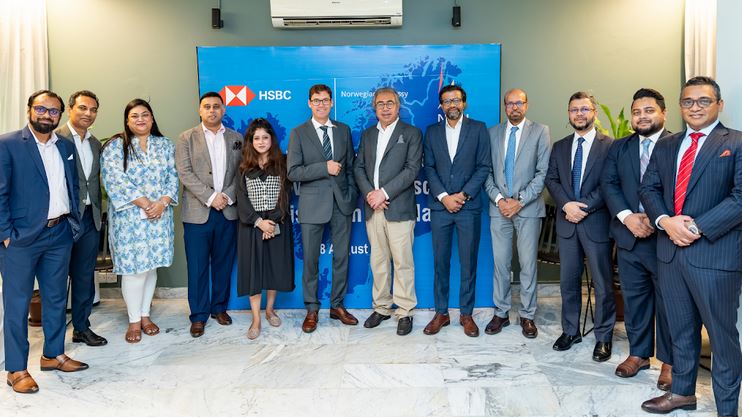News Flash

DHAKA, Sept 1, 2025 (BSS) – Experts at a high-level business session laid emphasis on a hole-of-ecosystem approach, combining regulatory reforms, private investment, public-private ialogue, and adoption of technology to solve logistics challenges.
They observed that Bangladesh’s logistics sector widely recognised as the backbone of its global trade.
They made the observation at the high-level business session titled, “Navigating the Future: The Evolving Landscape of Logistics in Bangladesh.”
Hosted by Håkon Arald Gulbrandsen, Ambassador of Norway at his residence, the session was jointly organised by the Royal Norwegian Embassy in Dhaka, the Hongkong and Shanghai Banking Corporation Limited (HSBC) Bangladesh, and the Nordic Chamber of Commerce and Industry (NCCI).
Bringing together regulators, global operators, and economic experts, the event examined how Bangladesh can overcome persistent bottlenecks in trade facilitation, reduce logistics costs, and enhance its competitiveness as the country enters a new era of economic transformation.
The session opened with welcome remarks by Håkon Arald Gulbrandsen, Ambassador of Norway to Bangladesh, followed by Tanveer Mohammad, President of NCCI and CCAO of Grameenphone, and Md Mahbub ur Rahman, CEO of HSBC Bangladesh.
The keynote presentation was delivered by M Masrur Reaz, Chairman and CEO of Policy Exchange Bangladesh, and the panel discussion was joined by Rear Admiral Saleh Mohammad Moniruzzaman, Chairman, Chittagong Port Authority and Nikhil D. Lima, Managing Director, Maersk Bangladesh.
During the keynote presentation, M Masrur Reaz provided a data-driven outlook on the sector’s future.
He highlighted that without rapid reforms, Bangladesh risks losing its competitive edge in global value chains, particularly as preferential trade agreements phase out in the coming decade.
The discussion highlighted, Bangladesh currently handles over 90% of its trade through the Chittagong Port, placing immense pressure on a single gateway. While mega projects such as the Bay Terminal, Matarbari deep-sea port, and Mongla expansion are underway, industry leaders spoke about the required improvements in customs clearance, infrastructure, policy supports and so on.
While it has been identified that the overall logistic cost is still on the higher side in Bangladesh, some small improvements have the potentiality to bring remarkable results.
M Masrur Reaz in the event estimated, just 1% reduction in transport cost can increase RMG exports by 7.4%.
On the other hand, if logistics cost in Bangladesh can be reduced through some infrastructure and policy improvements by just 25%, exports of the country can increase by 20%, he added.
He said, “Ensuring the minimum speed at just 40 km/hr in Bangladesh’s national highway can increase the exports by 3.7% and reduction in dwell time by just one day can boost national export by 7%+.”
Håkon Arald Gulbrandsen shared his insights and added “As Bangladesh charts its path to middle-income status, an efficient logistics sector is not just a priority, and it’s a necessity. Norway stands ready to partner with Bangladesh in this journey, combining our maritime expertise, green technology, and digital innovation to support a sustainable, interconnected future.”
Speaking on behalf of the Nordic business community, Tanveer Mohammad emphasised the urgency of reform and added, “For Bangladesh to sustain its growth momentum and attract high-quality investment, logistics must move from being a bottleneck to being an enabler of trade. Nordic companies, with their expertise in sustainable supply chains and digital transformation, are eager to partner in this journey. Together, we must build a logistics ecosystem that is competitive, resilient, and future-ready.”
Speaking at the event Md Mahbub ur Rahman mentioned, “As the leading international bank in Bangladesh, HSBC remains ready to connect the unique synergies that exist in the Bangladesh Nordic corridor. With the evolving global trade landscape, logistics will remain crucial for making our businesses competitive. This competitiveness will also depend on national infrastructure – port and beyond that will require reform, selective privatisation, and better multimodal integration. Our bilateral trade agreements will also remain pivotal as we move towards LDC graduation – regardless of when it happens.”